契诃夫 英文简介
凡卡作者安东·巴甫洛维奇·契诃夫简介
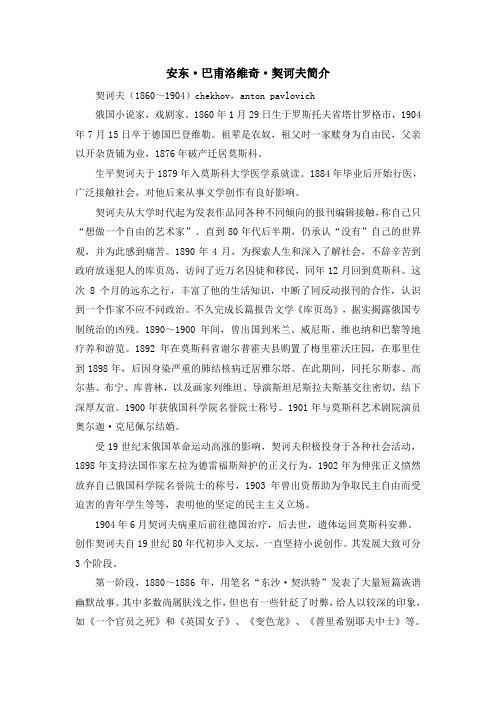
安东·巴甫洛维奇·契诃夫简介契诃夫(1860~1904)chekhov,anton pavlovich俄国小说家,戏剧家。
1860年1月29日生于罗斯托夫省塔甘罗格市,1904年7月15日卒于德国巴登维勒。
祖辈是农奴,祖父时一家赎身为自由民,父亲以开杂货铺为业,1876年破产迁居莫斯科。
生平契诃夫于1879年入莫斯科大学医学系就读。
1884年毕业后开始行医,广泛接触社会,对他后来从事文学创作有良好影响。
契诃夫从大学时代起为发表作品同各种不同倾向的报刊编辑接触,称自己只“想做一个自由的艺术家”。
直到80年代后半期,仍承认“没有”自己的世界观,并为此感到痛苦。
1890年4月,为探索人生和深入了解社会,不辞辛苦到政府放逐犯人的库页岛,访问了近万名囚徒和移民,同年12月回到莫斯科。
这次8 个月的远东之行,丰富了他的生活知识,中断了同反动报刊的合作,认识到一个作家不应不问政治。
不久完成长篇报告文学《库页岛》,据实揭露俄国专制统治的凶残。
1890~1900年间,曾出国到米兰、威尼斯、维也纳和巴黎等地疗养和游览。
1892年在莫斯科省谢尔普霍夫县购置了梅里霍沃庄园,在那里住到1898年,后因身染严重的肺结核病迁居雅尔塔。
在此期间,同托尔斯泰、高尔基、布宁、库普林,以及画家列维坦、导演斯坦尼斯拉夫斯基交往密切,结下深厚友谊。
1900年获俄国科学院名誉院士称号。
1901年与莫斯科艺术剧院演员奥尔迦·克尼佩尔结婚。
受19世纪末俄国革命运动高涨的影响,契诃夫积极投身于各种社会活动,1898年支持法国作家左拉为德雷福斯辩护的正义行为,1902年为伸张正义愤然放弃自己俄国科学院名誉院士的称号,1903年曾出资帮助为争取民主自由而受迫害的青年学生等等,表明他的坚定的民主主义立场。
1904年6月契诃夫病重后前往德国治疗,后去世,遗体运回莫斯科安葬。
创作契诃夫自19世纪80年代初步入文坛,一直坚持小说创作。
文学家契诃夫的简介
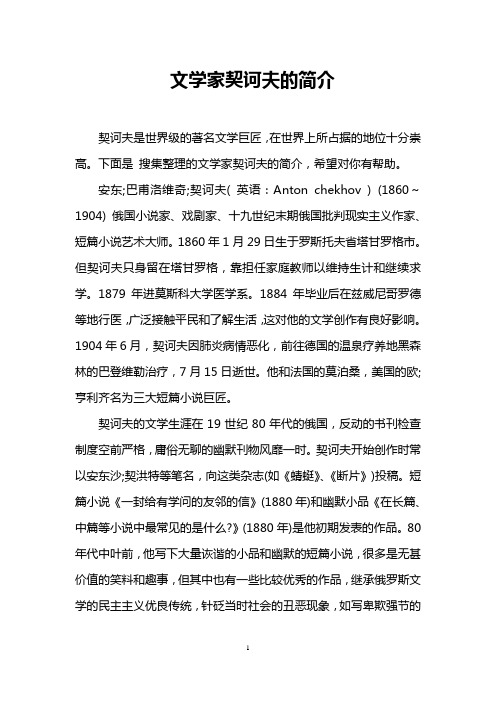
文学家契诃夫的简介契诃夫是世界级的著名文学巨匠,在世界上所占据的地位十分崇高。
下面是搜集整理的文学家契诃夫的简介,希望对你有帮助。
安东;巴甫洛维奇;契诃夫( 英语:Аnton chekhov ) (1860~1904) 俄国小说家、戏剧家、十九世纪末期俄国批判现实主义作家、短篇小说艺术大师。
1860年1月29日生于罗斯托夫省塔甘罗格市。
但契诃夫只身留在塔甘罗格,靠担任家庭教师以维持生计和继续求学。
1879年进莫斯科大学医学系。
1884年毕业后在兹威尼哥罗德等地行医,广泛接触平民和了解生活,这对他的文学创作有良好影响。
1904年6月,契诃夫因肺炎病情恶化,前往德国的温泉疗养地黑森林的巴登维勒治疗,7月15日逝世。
他和法国的莫泊桑,美国的欧;亨利齐名为三大短篇小说巨匠。
契诃夫的文学生涯在19世纪80年代的俄国,反动的书刊检查制度空前严格,庸俗无聊的幽默刊物风靡一时。
契诃夫开始创作时常以安东沙;契洪特等笔名,向这类杂志(如《蜻蜓》、《断片》)投稿。
短篇小说《一封给有学问的友邻的信》(1880年)和幽默小品《在长篇、中篇等小说中最常见的是什么?》(1880年)是他初期发表的作品。
80年代中叶前,他写下大量诙谐的小品和幽默的短篇小说,很多是无甚价值的笑料和趣事,但其中也有一些比较优秀的作品,继承俄罗斯文学的民主主义优良传统,针砭当时社会的丑恶现象,如写卑欺强节的小官吏(《在钉子上》、《小公务员之死》、《胜利者的胜利》,均1883年),凌辱弱者的士绅和老爷(《英国女子》1883年),见风使舵的奴才骨(《变色龙》,1884年),专制制度的卫道士(《普里希别叶夫中士》,1885年)。
但他迫于生计和缺乏经验,在当时主要只求速成和多产。
1886年3月,名作家格里戈罗维奇写信要他尊重自己的才华,他深受启发,开始严肃对待创作。
写于1886年的《凡卡》、《苦恼》和1888年的《渴睡》,表现了作家对穷苦劳动者的深切同情。
1888年问世的著名中篇小说《草原》描绘和歌颂了祖国的大自然,思考农民的命运,表达人民对幸福生活的渴望。
契诃夫研究
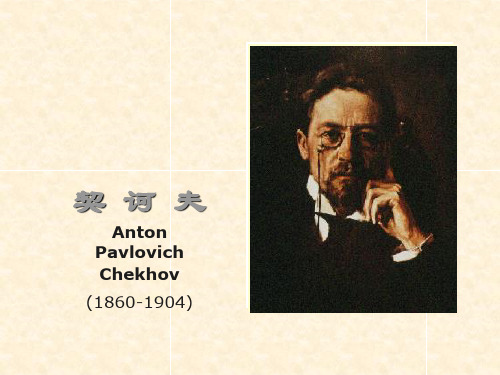
五、朴作品大多是凡 人小事、日常生活。朴素的就像生活本身一样,真 实而自然。《套中人》
通过小事反应生活的本质,通过塑造人物来概括和 揭示重大的社会问题。
“纵式结构”重故事性 “横式结构”反映生活的本质 “立体结构”增大容量,展示丰富而深刻的内容。 在朴素自然中蕴涵着巨大的艺术容量。
生平与创作
民主战士
1897年法国的“德雷福斯案件”震动全欧时, 契诃夫正在欧洲疗养,他和左拉等欧洲进步作家一样, 坚决站在受诬陷的犹太血统军官一边,给他以巨大的 声援。
1902年,他抗议科学院屈服于沙皇尼古拉二世 的粗暴干预而撤销高尔基的名誉院士资格,并与柯罗 连科一起,毅然放弃两年前获得的名誉院士称号。
“席加洛夫将军?哦!……替我把大衣脱下来……真要 命,天这么热!看样子多半要下雨了……只是有一件事我还 不懂:它怎么会咬着你的?”
艺术成就
《变色龙》
“难道它会够着你的手指头吗?它是那么小;你呢,却 长得这么魁伟!你那手指头一定是给小钉子弄破的,后来 却异想天开,想得到一笔什么赔偿损失费了。你这种人 啊……我可知道你们这些鬼东西是什么玩意儿!”
情节基础不是肤浅的趣味故事,也不是少见的特殊事例, 而是平凡常见的日常生活。
不着眼于情节的展开,而是注重表达人物的内心体验。在 有限的篇幅内勾勒出人物精神面貌的变化过程。
善于用精巧恰当的景物描写来衬托人物的心理。 作者不直接表露情感,而是采取纯客观的叙述。
艺术成就
《变色龙》
“嗯!……不错……”奥楚蔑洛夫严厉地说,咳了一声, 拧起眉头“不错……这是谁家的狗?我绝不轻易放过这件事。 我要拿点颜色出来给那些放狗到处乱跑的人看看!……” “这好像是席加洛夫将军家的狗!”人群里有人说。
同时人物的那种病态精神又表现一种超前的现代意识。人 格的扭曲。
Chapter 21 Chekhov 契诃夫
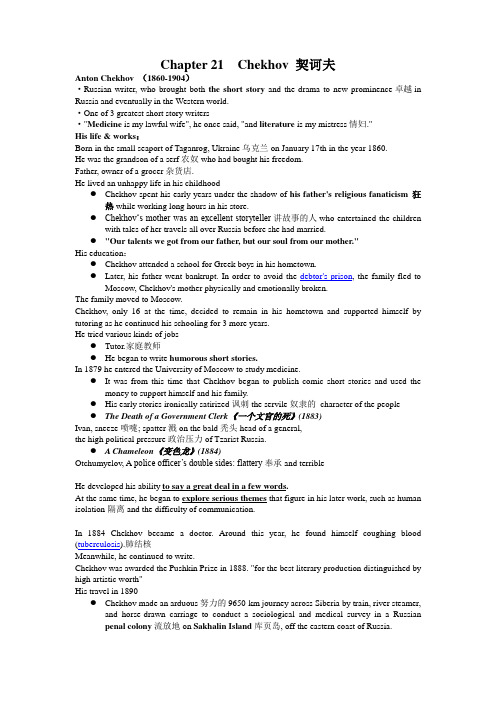
Chapter 21 Chekhov 契诃夫Anton Chekhov (1860-1904)·Russian writer, who brought both the short story and the drama to new prominence卓越in Russia and eventually in the Western world.·One of 3 greatest short story writers·"Medicine is my lawful wife", he once said, "and literature is my mistress情妇."His life & works:Born in the small seaport of Taganrog, Ukraine乌克兰on January 17th in the year 1860.He was the grandson of a serf农奴who had bought his freedom.Father, owner of a grocer杂货店.He lived an unhappy life in his childhood●Chekhov spent his early years under the shadow of his father's religious fanaticism 狂热while working long hours in his store.●Chekhov…s mother was an excellent storyteller讲故事的人who entertained the childrenwith tales of her travels all over Russia before she had married.●"Our talents we got from our father, but our soul from our mother."His education:●Chekhov attended a school for Greek boys in his hometown.●Later, his father went bankrupt. In order to avoid the debtor's prison, the family fled toMoscow, Chekhov's mother physically and emotionally broken.The family moved to Moscow.Chekhov, only 16 at the time, decided to remain in his hometown and supported himself by tutoring as he continued his schooling for 3 more years.He tried various kinds of jobs●Tutor.家庭教师●He began to write humorous short stories.In 1879 he entered the University of Moscow to study medicine.●It was from this time that Chekhov began to publish comic short stories and used themoney to support himself and his family.●His early stories ironically satirized讽刺the servile奴隶的character of the people●The Death of a Government Clerk《一个文官的死》(1883)Ivan, sneeze喷嚏; spatter溅on the bald秃头head of a general,the high political pressure政治压力of Tzarist Russia.● A Chameleon《变色龙》(1884)Otchumyelov, A police officer‟s double sides: flattery奉承and terribleHe developed his ability to say a great deal in a few words.At the same time, he began to explore serious themes that figure in his later work, such as human isolation隔离and the difficulty of communication.In 1884 Chekhov became a doctor. Around this year, he found himself coughing blood (tuberculosis).肺结核Meanwhile, he continued to write.Chekhov was awarded the Pushkin Prize in 1888. "for the best literary production distinguished by high artistic worth"His travel in 1890●Chekhov made an arduous努力的9650-km journey across Siberia by train, river steamer,and horse-drawn carriage to conduct a sociological and medical survey in a Russian penal colony流放地on Sakhalin Island库页岛, off the eastern coast of Russia.A Journey To Sakhalin库页岛is an amazing document.●“Hell Island!”●This book had some influence in moderating the harsh严厉的prison rule on the island. Around the year 1890, Chekhov moved toward publishing longer, more serious and more technically accomplished stories.●Ward No. 6(1892)《第六病室》mental patientsDoctor Andrey Y efimitch 拉京The door keeper Nikita 尼基达The story deals with the persecution to the common peopleand the consequences of indifference to human suffering.● A Man in a Case (1898)《套中人》Byelikov “I hope it won't lead to anything!”The story satirized讽刺the old tradition and autocratic专制的government.He also wrote plays戏剧:In his dramatic works Chekhov sought to convey the texture本质of everyday life, moving away from traditional ideas of plot情节and conventions惯例of dramatic speech.The major theme in Anton Chekhov's plays:●the psychologically bitterness苦难、怨恨of the Russian intellectuals知识分子●The Seagull《海鸥》(1896)Three a rtists‟ unfortunate fate.●Uncle V anya《万尼亚舅舅》(1899)The embodiment体现of the Russian intellectuals’unfortunate fate●Three Sisters《三姐妹》(1901)Three kind-hearted intellectual sisters and their helplesswaitingThe three sisters never realized their dream to go to Moscow (a major symbolic element).The Cherry Orchard《樱桃园》(1904)is his last drama works●The play concerns an aristocratic Russian woman and her family as they return to thefamily's estate (which includes a large and well-known cherry orchard) just before it is auctioned拍卖to pay the debt.the passing away of the old, aristocratic RussiaLopakhin,the former serf, who becoming an upstart暴发户, rich and powerful but rude and violent.Lopakhin had all the trees cut down, …This symbolizes the society changed by capitalism资本主义with its violence.Lopakhin, a neighbor of Madame Ranevsky, the former serf●The story presents themes of cultural futility无用、徒劳—both the futility ofthe aristocracy贵族 to maintain its status and the futility of the bourgeoisie资产阶级to find meaning in its newfound materialism唯物主义.Chekhov and Olga, 1901, on honeymoon 结婚His style (1):●Taking a cool冷静的, objective stance立场toward his characters, Chekhov conveystheir inner lives内心生活and feelings indirectly, by suggestion rather than statement陈述.His style (2):His plots are usually simple, and the endings of both his stories and his plays tend toward openness开放rather than finality定局.His style (3) - his realism:Chekhov‟s works create the effect of profound experience taking place beneath the surface in theordinary lives of unexceptional people.A warm-hearted writer●“We shall find the peace. We shall hear the angels. We shall see the sky sparkled闪耀with diamonds.”contents● 1. Russian background in late 19th century● 2. His early short stories● 3. his works after 1890s.● 4. His representative: Ward No. 6《第六病室》The Man in a Case《套中人》1. BackgroundA. society polarized偏振的.●Reform of Muzhik. (Emancipation reform ) The peasants who had lost their land andrushed into cities became industrial workers.●Contradiction between working class and bourgeoisie.B. The Russian PopulistsThe Russian Populists : to resist the prevail流行of capitalism with the traditional Russian patriarchal clan system 宗法制so as to establish the Russian socialism.In 1880s The social contradiction turned severe and the Russian government of Tzarist俄国帝制的autocracy 专制strengthened political pressure on the people.C. high political pressure●The Russian Populists assassinated暗杀Tzar Alexander II in 1881. This terrorist恐怖主义者action caused the overwhelming压倒性的revenge报复of Russian government over the Russian people.●In turn, Russian people became more and more intolerant of the government.2. his early storiesHis early stories ironically satirized the servile character of the people.●The Death of a Government Clerk《一个文官的死》● A Chameleon《变色龙》ONE fine evening, a no less fine government clerk called Ivan Dmitritch T chervyakov was sitting in the second row of the stalls, gazing through an opera glass at the Cloches de Corneville. "I have spattered him," thought T chervyakov, "he is not the head of my department, but still it is awkward. I must apologize."In mid-1880s his stories reveals a sympathy toward the miserable people.●Sorrow《哀伤》THE turner, Grigory Petrov, who had been known for years past as a splendid craftsman工匠, and at the same time as the most senseless愚蠢的peasant in the Galtchinskoy district区域, was taking his old woman to the hospital.His old woman died●At last, to make an end of uncertainty, without looking round he felt his old woman's coldhand. The lifted hand fell like a log.●"She is dead, then! What a business!"●And the turner cried. He was not so much sorry as annoyedHe nearly went insane疯狂的●V anka《万卡》V ANKA ZHUKOV, a boy of nine, who had been for three months apprenticed to Alyahin the shoemaker, was sitting up on Christmas Eve. Waiting till his master and mistress and their workmen had gone to the midnight service, he took out of his master's cupboard a bottle of ink and a pen with a rusty nib, and, spreading out a crumpled sheet of paper in front of him, began writing.His grandpa:●He was a thin but extraordinarily nimble and lively little old man of sixty-five, with aneverlastingly laughing face and drunken eyes. By day he slept in the servants' kitchen, or made jokes with the cooks; at night, wrapped in an ample sheepskin, he walked round the grounds and tapped with his little mallet木槌.3. His works after 1889After 1889 Chekhov turned into serious criticism on dark reality in his short stories.Ward No. 6《第六病室》The Man in a Case《套中人》(1888)4. His representativeWard No. 6《第六病室》:It deals with the consequences of indifference漠不关心to human suffering.·Andrey Y efimitch拉京,Doctor of Ward No. 6, a humanist, who believes in non-violence●In response to the last question Andrey Y efimitch turned rather red and said: "Y es, he ismentally deranged, but he is an interesting young man."●They asked him no other questions.Nikita tortures折磨Andrey Y efimitch:Nikita opened the door quickly, and roughly with both his hands and his knee shoved Andrey Y efimitch back, then swung his arm and punched him in the face with his fist.Andrey Y efimitch dies死:Next day Andrey Y efimitch was buried. Mihail Averyanitch and Daryushka were the only people at the funeral葬礼.·Nikita尼基达,The porter守门人, Nikita, an old soldier wearing rusty生锈的good-conduct stripes, is always lying on the litter with a pipe烟斗between his teeth. He has a grim冷酷的, surly板面孔的, battered磨损的-looking face, overhanging eyebrows which give him the expression of a sheep-dog of the steppes, and a red nose;he is short and looks thin and scraggy瘦弱的, but he is of imposing deportment行为举止and his fists are vigorous. He belongs to the class of simple-hearted, practical实际的, and dull-witted people, prompt in carrying out orders, who like discipline better than anything in the world, and so are convinced that it is their duty to beat people.His cruelty:He showers blows on the face, on the chest, on the back, on whatever comes first, and is convinced that there would be no order in the place if he did not.·Ivan Dmitritch Gromov格罗莫夫,a man of thirty-three, who is a gentleman by birth, and has been a court usher接待员and provincial secretary, suffers from the mania狂热of persecution.迫害an official called Gromov,Some twelve or fifteen years ago an official called Gromov, a highly respectable and prosperous person, was living in his own house in the principal street of the town. he was well educated and well read; according to the townspeople's notions, he knew everything, and was in their eyes something like a walking encyclopedia活百科全书He became persecution mania受迫害妄想症●In the morning Ivan Dmitritch got up from his bed in a state of horror惊骇, with coldperspiration汗水on his forehead, completely convinced that he might be arrested any minute.Ward No. 6 is a symbol of the Tzarist Russia●And its only function is to persecute迫害the common people in Russia.●Nikita symbolizes tools of the government.The Man in a Case《套中人》(1888):Byelikov tried to hide his thoughts●And Byelikov tried to hide his thoughts also in a case. The only things that were clear tohis mind were government circulars通告and newspaper articles in which something was forbidden.●Byelikov always says,"It is all right, of course; it is all very nice, but I hope it won't leadto anything!“●"Byelikov had a little bedroom like a box; his bed had curtains. When he went to bed hecovered his head over; it was hot and stuffy; the wind battered on the closed doors; there was a droning noise in the stove and a sound of sighs from the kitchen -- ominous sighs. . . . And he felt frightened under the bed-clothes.●He was afraid that something might happen, that Afanasy might murder him, that thievesmight break in, and so he had troubled dreams all night, and in the morning, when we went together to the high-school, he was depressed and pale, and it was evident that the high-school full of people excited dread and aversion恐惧和厌恶in his whole being, and that to walk beside me was irksome to a man of his solitary temperament.●"Y ou see and hear that they lie," said Ivan Ivanovitch, turning over on the other side,"and they call you a fool for putting up with their lying. Y ou endure insult and humiliation, and dare not openly say that you are on the side of the honest and the free, and you lie and smile yourself; and all that for the sake of a crust of bread, for the sake of a warm corner, for the sake of a wretched little worthless rank in the service. No, one can't go on living like this."不能这样生活Anthropus!恋爱的人。
文学家契诃夫的简介
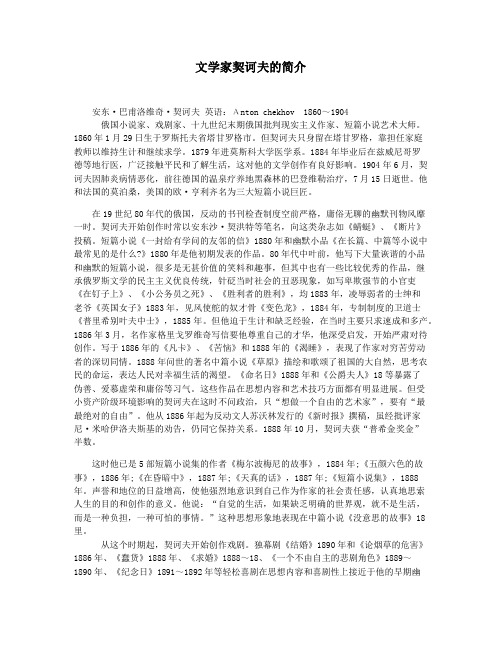
文学家契诃夫的简介安东·巴甫洛维奇·契诃夫英语:Аnton chekhov 1860~1904俄国小说家、戏剧家、十九世纪末期俄国批判现实主义作家、短篇小说艺术大师。
1860年1月29日生于罗斯托夫省塔甘罗格市。
但契诃夫只身留在塔甘罗格,靠担任家庭教师以维持生计和继续求学。
1879年进莫斯科大学医学系。
1884年毕业后在兹威尼哥罗德等地行医,广泛接触平民和了解生活,这对他的文学创作有良好影响。
1904年6月,契诃夫因肺炎病情恶化,前往德国的温泉疗养地黑森林的巴登维勒治疗,7月15日逝世。
他和法国的莫泊桑,美国的欧·亨利齐名为三大短篇小说巨匠。
在19世纪80年代的俄国,反动的书刊检查制度空前严格,庸俗无聊的幽默刊物风靡一时。
契诃夫开始创作时常以安东沙·契洪特等笔名,向这类杂志如《蜻蜓》、《断片》投稿。
短篇小说《一封给有学问的友邻的信》1880年和幽默小品《在长篇、中篇等小说中最常见的是什么?》1880年是他初期发表的作品。
80年代中叶前,他写下大量诙谐的小品和幽默的短篇小说,很多是无甚价值的笑料和趣事,但其中也有一些比较优秀的作品,继承俄罗斯文学的民主主义优良传统,针砭当时社会的丑恶现象,如写卑欺强节的小官吏《在钉子上》、《小公务员之死》、《胜利者的胜利》,均1883年,凌辱弱者的士绅和老爷《英国女子》1883年,见风使舵的奴才骨《变色龙》,1884年,专制制度的卫道士《普里希别叶夫中士》,1885年。
但他迫于生计和缺乏经验,在当时主要只求速成和多产。
1886年3月,名作家格里戈罗维奇写信要他尊重自己的才华,他深受启发,开始严肃对待创作。
写于1886年的《凡卡》、《苦恼》和1888年的《渴睡》,表现了作家对穷苦劳动者的深切同情。
1888年问世的著名中篇小说《草原》描绘和歌颂了祖国的大自然,思考农民的命运,表达人民对幸福生活的渴望。
《命名日》1888年和《公爵夫人》18等暴露了伪善、爱慕虚荣和庸俗等习气。
契诃夫写作特点
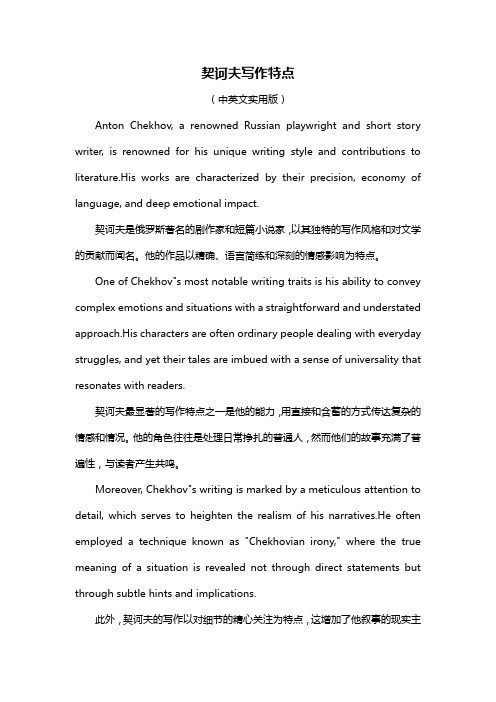
契诃夫写作特点(中英文实用版)Anton Chekhov, a renowned Russian playwright and short story writer, is renowned for his unique writing style and contributions to literature.His works are characterized by their precision, economy of language, and deep emotional impact.契诃夫是俄罗斯著名的剧作家和短篇小说家,以其独特的写作风格和对文学的贡献而闻名。
他的作品以精确、语言简练和深刻的情感影响为特点。
One of Chekhov"s most notable writing traits is his ability to convey complex emotions and situations with a straightforward and understated approach.His characters are often ordinary people dealing with everyday struggles, and yet their tales are imbued with a sense of universality that resonates with readers.契诃夫最显著的写作特点之一是他的能力,用直接和含蓄的方式传达复杂的情感和情况。
他的角色往往是处理日常挣扎的普通人,然而他们的故事充满了普遍性,与读者产生共鸣。
Moreover, Chekhov"s writing is marked by a meticulous attention to detail, which serves to heighten the realism of his narratives.He often employed a technique known as "Chekhovian irony," where the true meaning of a situation is revealed not through direct statements but through subtle hints and implications.此外,契诃夫的写作以对细节的精心关注为特点,这增加了他叙事的现实主义。
俄国小说家契诃夫简介
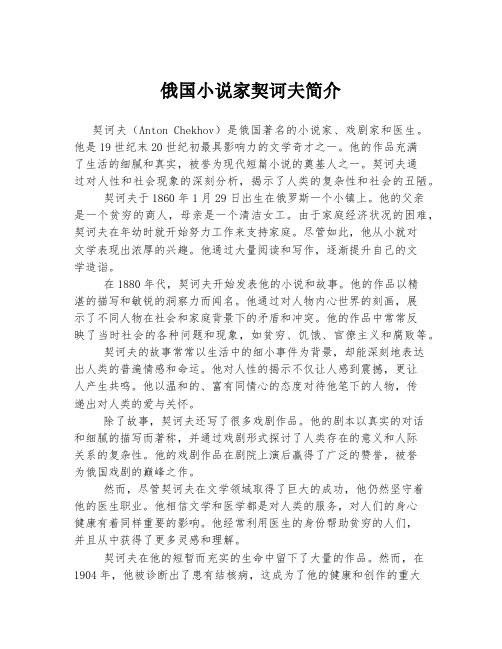
俄国小说家契诃夫简介契诃夫(Anton Chekhov)是俄国著名的小说家、戏剧家和医生。
他是19世纪末20世纪初最具影响力的文学奇才之一。
他的作品充满了生活的细腻和真实,被誉为现代短篇小说的奠基人之一。
契诃夫通过对人性和社会现象的深刻分析,揭示了人类的复杂性和社会的丑陋。
契诃夫于1860年1月29日出生在俄罗斯一个小镇上。
他的父亲是一个贫穷的商人,母亲是一个清洁女工。
由于家庭经济状况的困难,契诃夫在年幼时就开始努力工作来支持家庭。
尽管如此,他从小就对文学表现出浓厚的兴趣。
他通过大量阅读和写作,逐渐提升自己的文学造诣。
在1880年代,契诃夫开始发表他的小说和故事。
他的作品以精湛的描写和敏锐的洞察力而闻名。
他通过对人物内心世界的刻画,展示了不同人物在社会和家庭背景下的矛盾和冲突。
他的作品中常常反映了当时社会的各种问题和现象,如贫穷、饥饿、官僚主义和腐败等。
契诃夫的故事常常以生活中的细小事件为背景,却能深刻地表达出人类的普遍情感和命运。
他对人性的揭示不仅让人感到震撼,更让人产生共鸣。
他以温和的、富有同情心的态度对待他笔下的人物,传递出对人类的爱与关怀。
除了故事,契诃夫还写了很多戏剧作品。
他的剧本以真实的对话和细腻的描写而著称,并通过戏剧形式探讨了人类存在的意义和人际关系的复杂性。
他的戏剧作品在剧院上演后赢得了广泛的赞誉,被誉为俄国戏剧的巅峰之作。
然而,尽管契诃夫在文学领域取得了巨大的成功,他仍然坚守着他的医生职业。
他相信文学和医学都是对人类的服务,对人们的身心健康有着同样重要的影响。
他经常利用医生的身份帮助贫穷的人们,并且从中获得了更多灵感和理解。
契诃夫在他的短暂而充实的生命中留下了大量的作品。
然而,在1904年,他被诊断出了患有结核病,这成为了他的健康和创作的重大打击。
尽管面临生命的病痛,他依然坚持写作,并在不足十年的时间里完成了一系列杰作。
1908年,契诃夫在德国去世,享年44岁。
他的逝世给文学界带来了巨大的损失,但他的作品却长久地留存在世人心中。
契诃夫个人简介

契诃夫个人简介
中文名:契诃夫
外文名:Anton kowolski vicki Chekhov/Антон Павлович Чехов
别名:安东·帕夫洛维奇·契诃夫
国籍:俄国
出生地:俄国罗斯托夫州塔甘罗格
出生日期:1860年1月29日
逝世日期:1904年7月15日
职业:作家
主要成就:成为世界短篇小说之王之一
世界短篇小说:巨匠
代表作品:《苦闷》、《凡卡》、《变色龙》等作品
文学运动现实主义
逝世地巴登维勒
安葬地俄罗斯联邦莫斯科市
配偶:契诃娃
莫斯科大学毕业,做过医生。
1880年开始发表作品。
是俄国的世界级短篇小说巨匠和俄国19世纪末期最后一位批判现实主义艺术大师世界三大短篇小说家之一。
其剧作对20世纪戏剧产生了很大的影响。
他坚持现实主义传统,注重描写俄国人民的日常生活,塑造具有典型性格的小人物,借此真实反映出当时俄国社会的状况。
他的作品的三大特征是对丑恶现象的嘲笑与对贫苦人民的深切的同情,并且其作品无情地揭露了沙皇统治下不合理的社会制度和社会的丑恶现象。
他的作品有很大的幽默性和艺术性。
其主要作品有《变色龙》、《乏味的故事》、《决斗》、《草原》、《农民》、《在峡谷里》、《海鸥》、《哀伤》、《苦恼》、《万尼亚舅舅》、《套中人》、《普里希别叶夫中士》、《第六病室》、《小公务员之死》小学人教版语文六年级下册第15课《凡卡》等。
- 1、下载文档前请自行甄别文档内容的完整性,平台不提供额外的编辑、内容补充、找答案等附加服务。
- 2、"仅部分预览"的文档,不可在线预览部分如存在完整性等问题,可反馈申请退款(可完整预览的文档不适用该条件!)。
- 3、如文档侵犯您的权益,请联系客服反馈,我们会尽快为您处理(人工客服工作时间:9:00-18:30)。
Short stories
A
Chameleon The Death of a Government Clerk
sputter
Pushkin Prize in 1888
A Man in a Case
Ward No. 6
He also wrote drama
The Cherry Orchard
in
the small seaport of Taganrog, Ukraine on January 17th in the year 1860.
His grandfather used to be a serf
He
was the son of a grocer and the grandson of a serf who had bought his freedom, that and that his sons, 19 years earlier.
His life & works
The house in Taganrog, Russia
Grandfather,
serf Father, owner of a grocer. He once said: "as a child, I don't have a childhood.
Anton Pavlovich Chekhov was born
His realism
Chekhov’s
works create the effect of profound experience taking place beneath the surface in the ordinary lives of unexceptional people.
A warm-hearted writer
“We
shall find the peace. We shall hear the angels. We shall see the sky sparkled with diomonds.”
He lived an unhappy life in his childhood
Chekhov
spent his early years under the shadow of his father's religious fanaticism while working long hours in his store.
Chekhov
Anton Chekhov
(1860-1904)
Anton Chekhov
Russian
writer, who brought both the short story and the drama to new prominence in Russia and eventually in the Western world.
The Seagull
(1896)
Chekhov and Tolstoy
Chekhov and Olga, 19Taking
a cool, objective stance toward his characters, Chekhov conveys their inner lives and feelings indirectly, by suggestion rather than statement. His plots are usually simple, and the endings of both his stories and his plays tend toward openness rather than finality.
